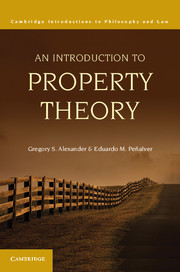5 - Property and Human Flourishing
Published online by Cambridge University Press: 05 June 2012
Summary
This chapter sets out a theory of property that aims at realizing the ideal of human flourishing. The theory draws inspiration from the political and moral theories of Aristotle and Thomas Aquinas. Though it departs in significant ways from those classical theories, enough debt to Aristotle remains that we will sometimes refer to the theory simply as “Aristotelian.” As background, we first briefly examine the historical ancestry of this theory, notably in Aristotle’s and Aquinas’s discussions of property.
ARISTOTLE
Human Nature
We begin with Aristotle’s famous statement, which he repeated seven times, that “a human being is by nature a political animal.” This statement contains both empirical and normative claims. Empirically, part of his meaning is that humans are social creatures and that we characteristically choose to live with others. As he states in the Nicomachean Ethics, “[n]o one would choose to have all good things all by himself, for man is a social and political being and his natural condition is to live with others.” Beyond this general inclination toward the company of others (at least sometimes), Aristotle also means that we have a deeper need to be part of a political community within which we experience richer and more complete lives than are available to us either alone or within small family units.
- Type
- Chapter
- Information
- An Introduction to Property Theory , pp. 80 - 102Publisher: Cambridge University PressPrint publication year: 2012

